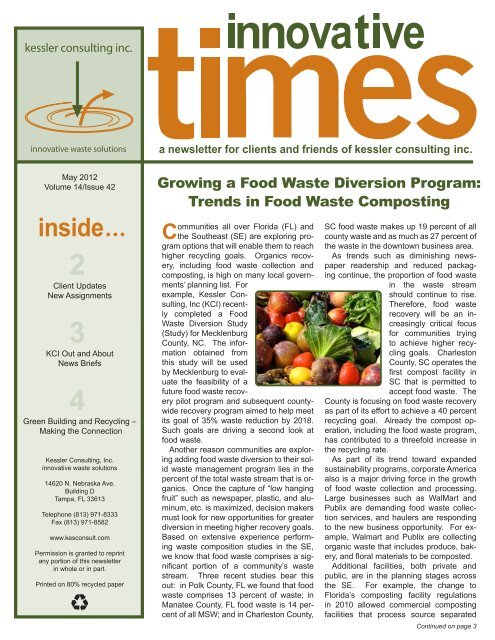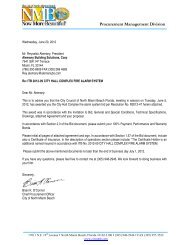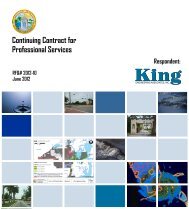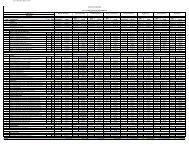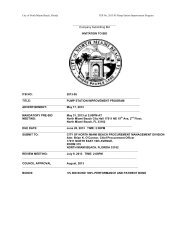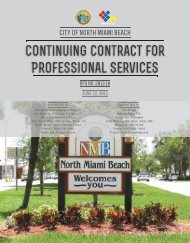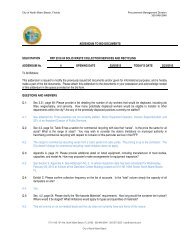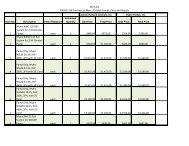Kessler Consulting
Kessler Consulting
Kessler Consulting
Create successful ePaper yourself
Turn your PDF publications into a flip-book with our unique Google optimized e-Paper software.
May 2012<br />
Volume 14/Issue 42<br />
Client Updates<br />
New Assignments<br />
KCI Out and About<br />
News Briefs<br />
Green Building and Recycling –<br />
Making the Connection<br />
<strong>Kessler</strong> <strong>Consulting</strong>, Inc.<br />
innovative waste solutions<br />
14620 N. Nebraska Ave.<br />
Building D<br />
Tampa, FL 33613<br />
Telephone (813) 971-8333<br />
Fax (813) 971-8582<br />
www.kesconsult.com<br />
Permission is granted to reprint<br />
any portion of this newsletter<br />
in whole or in part.<br />
Printed on 80% recycled paper<br />
Growing a Food Waste Diversion Program:<br />
Trends in Food Waste Composting<br />
Communities all over Florida (FL) and<br />
the Southeast (SE) are exploring program<br />
options that will enable them to reach<br />
higher recycling goals. Organics recovery,<br />
including food waste collection and<br />
composting, is high on many local governments’<br />
planning list. For<br />
example, <strong>Kessler</strong> <strong>Consulting</strong>,<br />
Inc (KCI) recently<br />
completed a Food<br />
Waste Diversion Study<br />
(Study) for Mecklenburg<br />
County, NC. The information<br />
obtained from<br />
this study will be used<br />
by Mecklenburg to evaluate<br />
the feasibility of a<br />
future food waste recovery<br />
pilot program and subsequent countywide<br />
recovery program aimed to help meet<br />
its goal of 35% waste reduction by 2018.<br />
Such goals are driving a second look at<br />
food waste.<br />
Another reason communities are exploring<br />
adding food waste diversion to their solid<br />
waste management program lies in the<br />
percent of the total waste stream that is organics.<br />
Once the capture of “low hanging<br />
fruit” such as newspaper, plastic, and aluminum,<br />
etc. is maximized, decision makers<br />
must look for new opportunities for greater<br />
diversion in meeting higher recovery goals.<br />
Based on extensive experience performing<br />
waste composition studies in the SE,<br />
we know that food waste comprises a significant<br />
portion of a community’s waste<br />
stream. Three recent studies bear this<br />
out: in Polk County, FL we found that food<br />
waste comprises 13 percent of waste; in<br />
Manatee County, FL food waste is 14 percent<br />
of all MSW; and in Charleston County,<br />
SC food waste makes up 19 percent of all<br />
county waste and as much as 27 percent of<br />
the waste in the downtown business area.<br />
As trends such as diminishing newspaper<br />
readership and reduced packaging<br />
continue, the proportion of food waste<br />
in the waste stream<br />
should continue to rise.<br />
Therefore, food waste<br />
recovery will be an increasingly<br />
critical focus<br />
for communities trying<br />
to achieve higher recycling<br />
goals. Charleston<br />
County, SC operates the<br />
first compost facility in<br />
SC that is permitted to<br />
accept food waste. The<br />
County is focusing on food waste recovery<br />
as part of its effort to achieve a 40 percent<br />
recycling goal. Already the compost operation,<br />
including the food waste program,<br />
has contributed to a threefold increase in<br />
the recycling rate.<br />
As part of its trend toward expanded<br />
sustainability programs, corporate America<br />
also is a major driving force in the growth<br />
of food waste collection and processing.<br />
Large businesses such as WalMart and<br />
Publix are demanding food waste collection<br />
services, and haulers are responding<br />
to the new business opportunity. For example,<br />
Walmart and Publix are collecting<br />
organic waste that includes produce, bakery,<br />
and floral materials to be composted.<br />
Additional facilities, both private and<br />
public, are in the planning stages across<br />
the SE. For example, the change to<br />
Florida’s composting facility regulations<br />
in 2010 allowed commercial composting<br />
facilities that process source separated<br />
Continued on page 3


